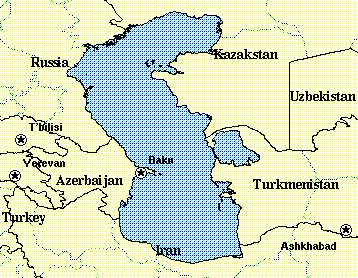WASHINGTON, D.C. -- The deadline is this Saturday; 40,000 Chechens trapped in Grozny have been delivered an ultimatum by Russia: "get out or die." And the Russians may also be using chemical weapons.
A communique, received today by The Wisdom Fund, from Mr. Colin Archer, Secretary-General International Peace Bureau states: "Russian forces are using chemical weapons in their attack on Grozny, declared three Chechen representatives at a meeting with journalists in Geneva this morning." The IPB is among the oldest of the international peace federations covering issues ranging from nuclear weapons and landmines to conflict resolution and peace education.
President Clinton has criticized the Russian ultimatum to civilians, calling it "a threat to the lives of the old, the infirm, the injured people and other innocent civilians who simply cannot leave or are too scared to leave their homes."
But the Russians have shrugged off the West's belated criticism. Russia had earlier been given the green light for the attack on Chechnya by U.S. Secretary of State Madeleine Albright who dismissed proposals for cutting off aid to Russia.
BBC News reported (Nov. 5) that Secretary Albright said the war in Chechnya must not be allowed to damage relations between Russia and the West, and turn Russia back into a Cold War enemy. Albright added, "We believe it is very important for there to be economic stability in Russia. That is in our national interest."
Russia launched this war on Chechnya in retaliation for alleged bombings of apartment buildings in Moscow. The Chechens deny they are responsible, and view the war as being prosecuted primarily to assure the election prospects of Russian prime minister Vladimir Putin.
"Russian parliamentary elections are scheduled for Dec. 19, and the results are regarded as a bellwether for next year's presidential vote. Putin has staked his presidential candidacy on the war's outcome, and so far his popularity has soared." (Daniel Williams, "Russia Tells Chechens: Leave Grozny or Die," The Washington Post, Dec. 7)
For Russia and the West the fate of the Chechens, who have suffered 250 years of brutal, colonial rule, is overshadowed by "The Great Game" -- a reference to the rivalry between Imperial Russia and the British Empire over influence in Central Asia at the end of the last century -- being replayed.

Thomas Goltz, author of "Azerbaijan Diary: A Rogue Reporter's Adventures in an Oil-rich, War-Torn, Post-Soviet Republic" due this winter writes: "This time the stakes are just as high -- control over the vast deposits of "sweet" crude oil beneath the Caspian Sea -- but there are more players. The United States (and the West) is taking a keen interest in the region as an alternative source of energy supply for the next century. Russia has long regarded the Caspian as its strategic reserve and Moscow does not take kindly to the prospect of the once-Soviet states which actually sit on the oil drilling their way to real economic independence.
Adds Goltz: "Iran is keenly interested both in becoming a player itself and in keeping the United States from dominating its back yard to the North. Turkey desperately seeks a sphere of influence of its own after being effectively locked out of the European Union. Even China, the new giant Tiger to the East, has indicated interest."
Michael T. Klare, professor of peace and world security studies at Hampshire College in Amherst, Mass., and the author of the forthcoming book, "Resource Wars: Global Geopolitics in the 21st Century" writes: "Now, in this new era of geopolitical competition, Clinton wants the oil to move along an east-west axis from Turkmenistan to Azerbaijan (this part traversing the Caspian Sea itself) and thence by land to Georgia and Turkey, thereby avoiding both Russia and Iran.
The agreement signed by Turkmenistan, Azerbaijan, Georgia and Turkey on November 18th in Istanbul achieves president Clinton's key objective, and raises the stakes for Russia.
Copyright © 1999 The Wisdom Fund - All Rights Reserved. Provided that it is not edited, and author name, organization, and URL are included, this article may be printed in newspapers and magazines, and e-mailed to others.
